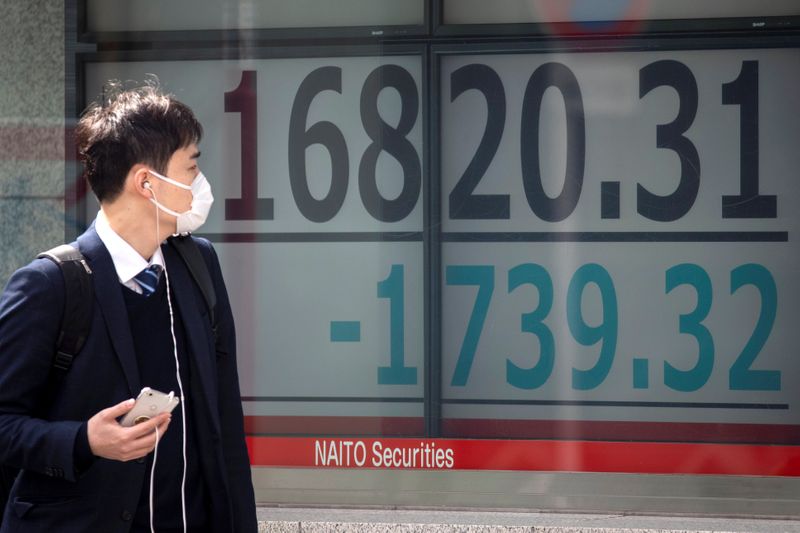By Wayne Cole
SYDNEY (Reuters) - Asian shares forged ahead on Tuesday while U.S. stock futures breached a major chart barrier as investors brushed past Sino-U.S. trade tensions to more stimulus in China and a re-opening world economy.
Japan's Nikkei (N225) took the lead with a rise of 1.7% to its highest since early March when the economic impact of the coronavirus was just becoming clear.
MSCI (NYSE:MSCI)'s broadest index of Asia-Pacific shares outside Japan advanced 1.6%, while South Korea (KS11) rose 1.5%.
E-Mini futures for the S&P 500 climbed 2% to clear the 3,000 chart level. EUROSTOXX 50 futures added 0.98% and FTSE futures 2.2%.
Chinese blue chips (CSI300) firmed 0.8% after the country's central bank said it would strengthen economic policy and continue to push to lower interest rates on loans.
While largely reiterations of past comments, they helped offset the war of words between Washington and Beijing over trade, the coronavirus and China's proposals for stricter security laws in Hong Kong.
"U.S.-China tensions continue to simmer in the background, but equity investors appear more interested on the prospect of economies reopening around the globe," said Rodrigo Catril, a senior FX strategist at NAB.
"On this score, Japan ended its nationwide state of emergency, Spaniards have returned to bars in Madrid wearing masks and England will reopen some businesses on June 1."
There were reports Tuesday that Germany wants to end a travel warning for tourist trips to 31 European countries from June 15 if the coronavirus situation allows.
Bond investors suspect economies will still need massive amounts of central bank support long after they reopen and that is keeping yields low even as governments borrow much more.
Yields on U.S. 10-year notes were trading at 0.67% having recovered from a blip up to 0.68% last week when the market absorbed a tidal wave of new issuance.
The decline in U.S. yields might have been a burden for the dollar but with rates everywhere near or less than zero, major currencies have been holding to tight ranges.
The dollar was a fraction firmer on the yen on Monday at 107.83
The euro was a shade firmer at $1.0916 (EUR=), having spent the month so far wandering between $1.0765 and $1.1017.
Against a basket of currencies the dollar was 0.2% lower at 99.620 (=USD), but still sandwiched between support at 99.001 and resistance around 100.560.
Analysts at CBA felt the dollar could break higher should China-U.S. tensions actually threaten their trade deal.
"Although not our central scenario, if the U.S. or China were to withdraw from the Phase One deal, USD would sharply appreciate while CNH, AUD and NZD would decline," they wrote in a note to clients.
In commodity markets, gold edged up 0.2% to $1,733 an ounce.
Oil prices were supported by falling supplies as OPEC cut production and the number of U.S. and Canadian rigs dropped to record lows for the third week running.

Brent crude futures rose 71 cents to $36.24 a barrel, while U.S. crude gained $1.14 to $34.39.